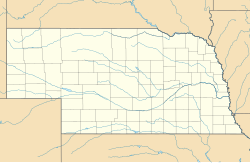Stolley, William, Homestead and Site of Fort Independence | |
 The house in 2011 | |
| Location | 2103 Stolley Park Road West, Stolley Park, Grand Island, Nebraska |
|---|---|
| Coordinates | 40°54′02″N98°21′33″W / 40.90056°N 98.35917°W |
| Area | 6 acres (2.4 ha) |
| Built | 1857 |
| NRHP reference No. | 72001584 [1] |
| Added to NRHP | March 16, 1972 |
The Stolley Homestead Site is a historic house in Grand Island, Nebraska. It was built in 1858-1859 as a log cabin by William Stolley, an immigrant from Schleswig-Holstein, Germany. [2] The property was acquired by the state of Nebraska in 1927. [2] It has been listed on the National Register of Historic Places since March 16, 1972. [1]

